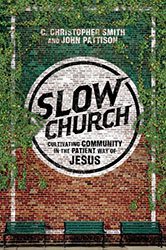 A Response to Slow Church: Cultivating Community in the Patient Way of Jesus, by Christopher Smith and John Pattison
A Response to Slow Church: Cultivating Community in the Patient Way of Jesus, by Christopher Smith and John Pattison
In a recent conversation, a young adult noted, “I’m not interested in going to the big church down the road, with its band and big screen. It’s just like the mall. When I go to church, I want a few minutes of calm and peace. All week I’m texting and on line. I spend most of my day in front of a screen. I want a quiet time to reflect on my life. I want to look at people, not screens at church.”
His words echo those of another young person who asserted, “I like our church’s outreach programs because they’re so different from my job and social life. They’re slow paced and deliberate and focus on people. We can spend a day pounding nails and sharing stories, and it’s great. We get the job done, and we sure have fun.”
The New Testament notes two ways to approach time, chronos and kairos. Chronos time is evenly moving time, measured by sundials, sunrise and sunset, moons, clocks, and digits. Chronos time is necessary to a good life, but it is always moving, with each moment we have less time, and are tempted to work faster, substituting quantity for quality. It emphasizes fast food, quick responses, easy answers, and formulae that fit everyone generically. In contrast, kairos time is meaningful; it is the fullness of time in which the Messiah comes; it is the right time for a task to be done. Kairos time is qualitative, contemplative, deliberate, and relational. It prizes depth over efficiency, and process over product. Kairos time moves within clock and digital time, balancing relationship with efficiency, care with effectiveness, and reconciliation with conviction.
The distinction between kairos and chronos time has theological implications. Authors Smith and Pattison invite us to slow down spiritually and theologically. They awaken us to see faith as something that grows organically and personally. There are no easy and quick answers applicable to everyone. Creeds provide a highway that helps congregations and denominations journey in faith, but there are many on ramps and off ramps. When someone says, “Jesus is Savior,” there are numerous responses to what salvation means. When someone invokes, “Christ died for my sins,” they discover that there are many New Testament and early Christian theories of atonement, not just sacrificial atonement. Salvation is not a formula but a process of growth. As one of my friends states: “When someone asks me if I’m saved, I respond with ‘how much time do you have?’” Faith takes time: kairos time trusts our lives to be in God’s care; knowing that we are in God’s hands with all our questions and hesistancy.
In my own pastoral leadership, I have emphasized my own type of slow church. We take time for silence as we begin worship and prior to the pastoral prayers. I pause a moment between the scriptures and sermon for another moment of meditation. During the week, we sponsor two meditation groups, consisting of stillness, breathing with the spirit, and lectio divina (an imaginative, meditative approach to scripture based on the spirituality of the Benedictine community). I have not eliminated more traditional bible studies, but have come to believe that the best way to study scripture involves the interplay of silence, personal insight, imagination, and teaching.
Slow church, open to transforming time, can even transformation children’s faith formation. Instead of relying solely on computer-based lessons or manipulative stations, we invite the children (as young as four years old) to take a moment of silence and read the scripture in spirit of lectio divina. This ancient practice inspires creativity and relationship with the text. It slows down time for a few minutes so that children can experience God’s presence more deeply. Even our children need to slow down as an antidote to the busyness of most children’s activities.
Psalm 46 proclaims “pause awhile and know that I am God.” The church is a place to pause and listen for God’s word and wisdom. God’s wisdom is not always in the jumbotron or the praise band, the church coffee house and congregational ATM, the mall-like atmosphere of megachurches, but in the still small voice of God within and among us. So let us take it slow, let our faith marinade, and listen for God’s word and wisdom moving us gently in grace.
To read an excerpt from Slow Church, visit the Patheos Book Club here.













